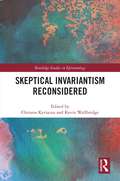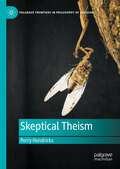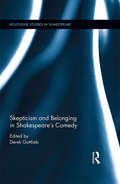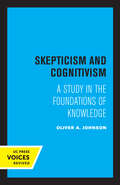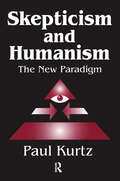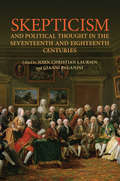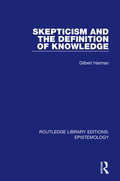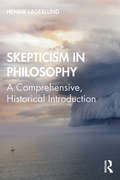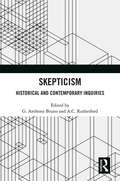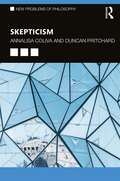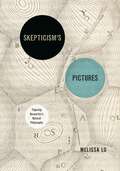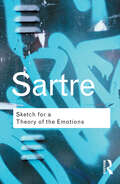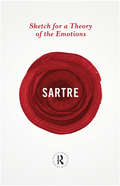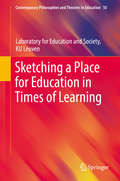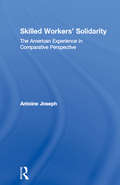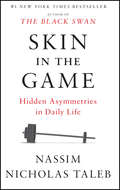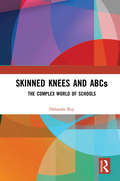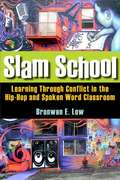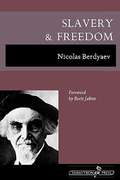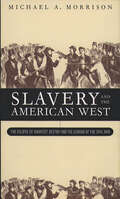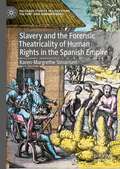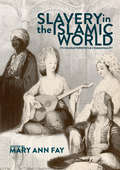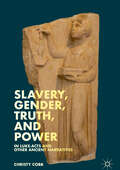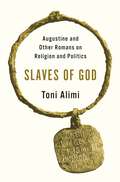- Table View
- List View
Skeptical Invariantism Reconsidered (Routledge Studies in Epistemology)
by Christos Kyriacou Kevin WallbridgeThis collection of original essays explores the topic of skeptical invariantism in theory of knowledge. It eschews historical perspectives and focuses on this traditionally underexplored, semantic characterization of skepticism. The book provides a carefully structured, state-of-the-art overview of skeptical invariantism and offers up new questions and avenues for future research. It treats this semantic form of skepticism as a serious position rather than assuming that skepticism is false and attempting to diagnose where arguments for skepticism go wrong. The essays take up a wide range of different philosophical perspectives on three key questions in the debate about skeptical invariantism: (1) whether the standards for knowledge vary, (2) how demanding the standards for knowledge are, and (3) whether the kind of evidence, reasons, methods, processes, etc. that we can bring to bear are sufficient to meet those standards. Skeptical Invariantism Reconsidered will be of interest to scholars and advanced students in epistemology and the philosophy of language.
Skeptical Theism (Palgrave Frontiers in Philosophy of Religion)
by Perry HendricksIs evil evidence against the existence of God? Does divine hiddenness provide an evidential problem for theism? Is our evolutionary history evidence that God doesn’t exist? Skeptical theism is the view that humans are cognitively limited in important ways that prevent us from providing affirmative answers to these evidential questions. In this book—the first monograph published on skeptical theism—Perry Hendricks gives careful, novel, and compelling arguments in favor of skeptical theism and provides a comprehensive defense of it, addressing all major objections to skeptical theism on offer. The implications of skeptical theism are teased out: it undermines the most prominent arguments for atheism on offer, which significantly lowers the epistemic status of atheism.
Skepticism and Belonging in Shakespeare's Comedy (Routledge Studies in Shakespeare)
by Derek GottliebThis book recovers a sense of the high stakes of Shakespearean comedy, arguing that the comedies, no less than the tragedies, serve to dramatize responses to the condition of being human, responses that invite scholarly investigation and explanation. Taking its cue from Stanley Cavell’s influential readings of Othello and Lear, the book argues that exposure or vulnerability to others is the source of both human happiness and human misery; while the tragedies showcase attempts at the evasion of such vulnerability through the self-defeating pursuit of epistemological certainty, the comedies present the drama and the difficulty of turning away from an epistemological register in order to productively respond to the fact of our humanity. Where Shakespeare’s tragedies might be viewed in Cavellian terms as the drama of skepticism, Shakespeare’s comedies then exemplify the drama of acknowledgement. As a parallel and a preamble, Gottlieb suggests that the field of literary studies is itself a site of such revealing responses: where competing research methods strive to foreclose upon (or, alternatively, rejoice in) epistemological uncertainty, such commitments bespeak an urge to avoid or circumvent the human in the practice of scholarship. Reading Shakespeare’s comedies in tandem with a "defactoist" view of teaching and learning points in the direction of a new humanism, one that eschews both the relativism of old deconstruction and contemporary Presentism and the determinism of various kinds of structural accounts. This book offers something new in scholarly and popular understanding of Shakespeare’s work, doing so with both philosophical rigor and literary attention to the difficult work of reading.
Skepticism and Cognitivism: A Study in the Foundations of Knowledge
by Oliver A. JohnsonSkepticism and Cognitivism addresses the fundamental question of epistemology: Is knowledge possible? It approaches this query with an evaluation of the skeptical tradition in Western philosophy, analyzing thinkers who have claimed that we can know nothing. After an introductory chapter lays out the central issues, chapter 2 focuses on the classical skeptics of the Academic and Pyrrhonistic schools and then on the skepticism of David Hume. Chapters 3 through 5 are devoted to contemporary defenders of skepticism—Keith Lehrer, Arne Næss, and Peter Unger. In chapter 6, author Oliver A. Johnson dons the mantle of skeptic himself and develops and adds theories to the skeptical arsenal. He closes with an examination of the relationship between skepticism and cognitivism, reaching and defending conclusions on the nature and extent of possible human knowledge. This title is part of UC Press's Voices Revived program, which commemorates University of California Press’s mission to seek out and cultivate the brightest minds and give them voice, reach, and impact. Drawing on a backlist dating to 1893, Voices Revived makes high-quality, peer-reviewed scholarship accessible once again using print-on-demand technology. This title was originally published in 1978.
Skepticism and Humanism: The New Paradigm
by Paul KurtzAs we begin the third millennium there is cause for cautious optimism regarding the human prospect. Democratic revolutions and the doctrine of universal human rights have captured the imagination of large sectors of humanity, while major advances in science and technology continue to conquer disease and extend life, contributing to rising standards of living, affluence, and cultural freedom on a worldwide basis. Paradoxically, at the same time ancient authoritarian fundamentalist religions have grown in vitriolic intensity along with bizarre New Age, media-driven paranormal belief systems. Also surprising is the resurgence of primitive tribal and ethnic loyalties, unleashing wars of intolerance and bitterness. In Skepticism and Humanism, Paul Kurtz locates these threatening developments within a long-standing and largely unchallenged theological worldview. He proposes, as an alternative to religion, a new cultural paradigm rooted in scientific naturalism, rationalism, and a humanistic outlook.An estimated 60 percent of scientists are atheists or agnostics. However, the skeptical world view has been given little currency even in advanced societies, because of a cultural prohibition against the criticism of religion. At the same time, science has become increasingly narrow and specialized so that few people can draw on its broader intellectual and cultural implications. Skepticism and Humanism attempts to meet this need. It defends skepticism as a method for developing reliable knowledge by using scientific inquiry and reason to test all claims to truth. It also defends scientific naturalism-an evolutionary view of nature, life, and the human species. Kurtz sees the dominant religious doctrines as drawn from an agricultural/nomadic past, and emphasizes the need for a new outlook applicable to the postindustrial information age. At the same time, he rejects postmodernism for abandoning science and embracing a form of nihilism.There can be no doubt that as a new global civilization emerges, scientific naturalism, rationalism, and secular humanism have something significant to say about the meaning of life. Skepticism and Humanism shows how they can to foster democratic values and social prosperity. The book will be important for philosophers, scientists, and all those concerned with contemporary issues.
Skepticism and Political Thought in the Seventeenth and Eighteenth Centuries
by Gianni Paganini John Christian LaursenIn this collection, thirteen distinguished contributors examine the influence of the ancient skeptical philosophy of Pyrrho of Elis and Sextus Empiricus on early modern political thought. Classical skepticism argues that in the absence of certainty one must either suspend judgment and live by habit or act on the basis of probability rather than certainty. In either case, one must reject dogmatic confidence in politics and philosophy.Surveying the use of skepticism in works by Hobbes, Descartes, Hume, Smith, and Kant, among others, the essays in Skepticism and Political Thought in the Seventeenth and Eighteenth Centuries demonstrate the pervasive impact of skepticism on the intellectual landscape of early modern Europe. This volume is not just an authoritative account of skepticism's importance from the Enlightenment to the French Revolution, it is also the basis for understanding skepticism's continuing political implications.
Skepticism and the Definition of Knowledge (Routledge Library Editions: Epistemology)
by Gilbert HarmanOriginally published in 1990. This study argues that scepticism is an intelligible view and that the issue scepticism raises is whether or not certain sceptical hypotheses are as plausible as the ordinary views we accept. It discusses psychological concepts, definitions of knowledge, belief and hypothetic inference (inference to the best explanation). Starting from ‘Is skepticism a problem for epistemology’, the book takes us through the argument for the possibility of scepticism, including looking at sense data and considering memory and perception.
Skepticism in Philosophy: A Comprehensive, Historical Introduction
by Henrik LagerlundIn this book, Henrik Lagerlund offers students, researchers, and advanced general readers the first complete history of what is perhaps the most famous of all philosophical problems: skepticism. As the first of its kind, the book traces the influence of philosophical skepticism from its roots in the Hellenistic schools of Pyrrhonism and the Middle Academy up to its impact inside and outside of philosophy today. Along the way, the book covers skepticism during the Latin, Arabic, and Greek Middle Ages and during the Renaissance before moving on to cover Descartes’ methodological skepticism and Pierre Bayle’s super-skepticism in the seventeenth century. In the eighteenth century, it deals with Humean skepticism and the anti-skepticism of Reid, Shepherd, and Kant, taking care to also include reflections on the connections between idealism and skepticism (including skepticism in German idealism after Kant). The book covers similar themes in a chapter on G.E. Moore and Ludwig Wittgenstein, and then ends its historical overview with a chapter on skepticism in contemporary philosophy. In the final chapter, Lagerlund captures some of skepticism’s impact outside of philosophy, highlighting its relation to issues like the replication crisis in science and knowledge resistance.
Skepticism: Historical and Contemporary Inquiries
by A. C. Rutherford G. BrunoSkepticism is one of the most enduring and profound of philosophical problems. With its roots in Plato and the Sceptics to Descartes, Hume, Kant and Wittgenstein, skepticism presents a challenge that every philosopher must reckon with. In this outstanding collection philosophers engage with skepticism in five clear sections: the philosophical history of skepticism in Greek, Cartesian and Kantian thought; the nature and limits of certainty; the possibility of knowledge and related problems such as perception and the debates between objective knowledge and constructivism; the transcendental method as a response to skepticism and the challenge of naturalism; overcoming the skeptical challenge. Skepticism: Historical and Contemporary Inquiries is essential reading for students and scholars in epistemology and the history of philosophy and will also be of interest to those in related disciplines such as religion and sociology.
Skepticism: Radical Skepticism And The Groundlessness Of Our Believing (New Problems of Philosophy #5)
by Duncan Pritchard Annalisa ColivaSkepticism is one of the perennial problems of philosophy: from antiquity, to the early modern period of Descartes and Hume, and right through to the present day. It remains a fundamental and widely studied topic and, as Annalisa Coliva and Duncan Pritchard show in Skepticism, it presents us with a paradox with important ramifications not only for epistemology but also for many other core areas of philosophy. This book provides a thorough grounding in contemporary debates about skepticism, exploring the following key topics: the core skeptical arguments, with a particular focus on Cartesian and Humean radical skepticism the epistemic principles that are held to underlie skeptical arguments, such as the Closure and Underdetermination principles the content externalism of Putnam, Davidson, and Chalmers, and how it might help us respond to radical skepticism the epistemic externalism/internalism distinction and how it relates to the skeptical problematic contextualism in epistemology and its anti-skeptical import the various interpretations of a Wittgensteinian hinge epistemology the viability of epistemological disjunctivism, including whether it can be combined with hinge epistemology as part of a dual response to radical skepticism liberal and conservative responses to the Humean skeptical paradox. Both authors are prominent figures who work on skepticism, and so one novelty of the book is that it provides an insight into their own contrasting responses to this philosophical difficulty. With the addition of annotated further reading and a glossary, this is an ideal starting point for anyone studying the philosophy of skepticism, along with students of epistemology, metaphysics, and contemporary analytic philosophy.
Skepticism: The Basics (The Basics)
by Juan Comesaña Manuel ComesañaThis book introduces students and other interested readers to the philosophical study of skepticism, a central and long-standing subject in philosophy. The first three chapters cover knowledge, providing the necessary foundation for introducing skepticism in the book's final three chapters. Throughout, the volume addresses basic questions in these two areas, such as: What are the differences between the three types of knowledge: direct knowledge, knowledge by ability, and propositional knowledge? What is the Gettier problem and why does it resist easy solutions? Why do philosophers still talk about René Descartes’ techniques for raising doubts about what we can know but have largely forgotten Descartes’ attempts to answer these doubts? How do we know that we’re not just brains in a vat? Is Pyrrhonian skepticism—the idea that we know absolutely nothing—ultimately self-refuting? With a glossary of key terms and suggestions for further reading, Skepticism: The Basics is an ideal starting point for anyone seeking a lively and accessible foray into the study of epistemology. Key Features and Benefits: Cover both traditional topics – like the tripartite conception of knowledge – and emerging issues, like knowledge-first epistemology and concessive responses to inductive skepticism Demystifies an area where beginners frequently get stuck: the difference between common-sense skepticism and philosophical skepticism Clearly explains the important contributions from historical and contemporary thinkers, like Descartes, Hume, Popper, Quine, Dretske, Strawson, Nozick, and Sosa
Skepticism’s Pictures: Figuring Descartes’s Natural Philosophy
by Melissa LoIn seventeenth-century northern Europe, as the Aristotelian foundations of scientia were rocked by observation, experiment, confessional strife, and political pressure, natural philosophers came to rely on the printed image to fortify their epistemologies—and none more so than René Descartes. In Skepticism’s Pictures, historian of science Melissa Lo chronicles the visual idioms that made, sustained, revised, and resisted Descartes’s new philosophy.Drawing on moon maps, political cartoons, student notebooks, treatises on practical mathematics, and other sources, Lo argues that Descartes transformed natural philosophy with the introduction of a new graphic language that inspired a wide range of pictorial responses shaped by religious affiliation, political commitment, and cultural convention. She begins by historicizing the graphic vocabularies of Descartes’s Essais and Principia philosophiae and goes on to analyze the religious and civic volatility of Descartes’s thought, which compelled defenders (such as Jacques Rohault and Wolferd Senguerd) to reconfigure his pictures according to their local visual cultures—and stimulated enemies (such as Gabriel Daniel) to unravel Descartes’s visual logic with devastating irony. In the epilogue, Lo explains why nineteenth-century French philosophers divorced Descartes’s thought from his pictures, creating a modern image of reason and a version of philosophy absent visuality.Engaging and accessible, Skepticism’s Pictures presents an exciting new approach to Descartes and the visual reception of seventeenth-century physics. It will appeal to historians of early modern European science, philosophy, art, and culture and to art historians interested in histories that give images their argumentative power.
Sketch for a Theory of the Emotions (Routledge Classics)
by Jean-Paul SartreAlthough written fairly early in his career, in 1939, Sketch for a Theory of the Emotions is considered to be one of Jean-Paul Sartre's most important pieces of writing. It not only anticipates but argues many of the ideas to be found in his famous Being and Nothingness. By subjecting the emotion theories of his day to critical analysis, Sartre opened up the world of psychology to new and creative ways of interpreting feelings. Emotions are intentional and strategic ways of coping with difficult situations. We choose to utilize them, we control them, and not the other way around, as has been posited elsewhere. Emotions are not fixed; they have no essence and indeed are subject to rapid fluctuations and about-turns. For its witty approach alone, Sartre's Sketch for a Theory of the Emotions can be enjoyed at length. It is a dazzling journey to one of the more intriguing theories of our time.
Sketch for a Theory of the Emotions (Routledge Great Minds)
by Jean-Paul SartrePhilosopher, novelist, dramatist and existentialist Jean-Paul Sartre is one of the greatest writers of all time. He was fascinated by the role played by the emotions in human life and placed them at the heart of his philosophy. This brilliant short work - which contains some of the principal ideas later to appear in his masterpiece Being and Nothingness - is Sartre at his best: insightful, engaging and controversial. Far from constraining one's freedom, as we often think, Sartre argues that emotions are fundamental to it and that an emotion is nothing less than 'a transformation of the world'. With a new foreword by Sebastian Gardner. ?
Sketching a Place for Education in Times of Learning (Contemporary Philosophies And Theories In Education Ser. #10)
by Society Laboratory For EducationThis book explores how traditional institutions of education are affected by the current discourse and practices of ‘learning’; and more specifically, how the evolution towards so-called ‘learning environments’ affects the kind of gathering or association that is staged and configured within families, schools and universities. In addition, it addresses the question of how to articulate what is educational in the context of ‘making’ family, school or university, and to what extent this making is always also a public act. The aim is to approach and investigate family, school and university as educational practices, to focus on the forms of gatherings or associations that take shape within them, and to explore the public, but also possible ‘privatizing’ character of these aspects. The book presents a diverse range of sketches intended as preparatory study exercises. What they all share, despite the different hands and eyes, and the different sensitivities, is the attempt to figure out what education is all about. Three objectives can be distinguished for the sketches: a cartographic one (to map the discourse of learning but also the discursive and material arrangements of actual educational practices), a morphological one (to describe the educational forms of gathering) and a theoretical one (to bring educational issues into the discussion). The book’s overall aims are to re-establish ‘the educational’ as an issue; to make it visible, to give it shape, to give it a voice, and to make it a thing that can and should be discussed, thus establishing a point of departure for further inquiry and its (re)invention.
Skilled Workers' Solidarity: The American Experience in Comparative Perspective (States and Societies #Vol. 7)
by Antoine JosephA comparative historical analysis of capitalist democracy, focusing on development in the United States and offering comparisons with other Western nations.
Skin in the Game: Hidden Asymmetries in Daily Life (Incerto)
by Nassim Nicholas Taleb#1 NEW YORK TIMES BESTSELLER • A bold work from the author of The Black Swan that challenges many of our long-held beliefs about risk and reward, politics and religion, finance and personal responsibility In his most provocative and practical book yet, one of the foremost thinkers of our time redefines what it means to understand the world, succeed in a profession, contribute to a fair and just society, detect nonsense, and influence others. Citing examples ranging from Hammurabi to Seneca, Antaeus the Giant to Donald Trump, Nassim Nicholas Taleb shows how the willingness to accept one&’s own risks is an essential attribute of heroes, saints, and flourishing people in all walks of life. As always both accessible and iconoclastic, Taleb challenges long-held beliefs about the values of those who spearhead military interventions, make financial investments, and propagate religious faiths. Among his insights: • For social justice, focus on symmetry and risk sharing. You cannot make profits and transfer the risks to others, as bankers and large corporations do. You cannot get rich without owning your own risk and paying for your own losses. Forcing skin in the game corrects this asymmetry better than thousands of laws and regulations. • Ethical rules aren&’t universal. You&’re part of a group larger than you, but it&’s still smaller than humanity in general. • Minorities, not majorities, run the world. The world is not run by consensus but by stubborn minorities imposing their tastes and ethics on others. • You can be an intellectual yet still be an idiot. &“Educated philistines&” have been wrong on everything from Stalinism to Iraq to low-carb diets. • Beware of complicated solutions (that someone was paid to find). A simple barbell can build muscle better than expensive new machines. • True religion is commitment, not just faith. How much you believe in something is manifested only by what you&’re willing to risk for it.The phrase &“skin in the game&” is one we have often heard but rarely stopped to truly dissect. It is the backbone of risk management, but it&’s also an astonishingly rich worldview that, as Taleb shows in this book, applies to all aspects of our lives. As Taleb says, &“The symmetry of skin in the game is a simple rule that&’s necessary for fairness and justice, and the ultimate BS-buster,&” and &“Never trust anyone who doesn&’t have skin in the game. Without it, fools and crooks will benefit, and their mistakes will never come back to haunt them.&”
Skinned Knees and ABCs: The Complex World of Schools
by Debarshi RoySkinned Knees and ABCs critically analyzes schools as sites for applied behaviour systems. It delves deep into the origin of various behavioural theories that affect these institutions and utilizes scientific theories in mathematics, behavioural economics and psychology (social, cognitive and educational) to examine the complexities, failures and successes of school systems. The book discusses the complex and chaotic nature of schools and the fundamental psychological constructs which form the basis for curriculum and behavioural designs. It also highlights the problems and peculiarities faced by students, parents and educators and suggests alternatives and solutions through real-life case studies. Drawing on in-depth research and theoretical know-how, the book will be of interest to students, teachers and researchers of school education, organizational behaviour, behavioural sciences and applied psychology. It will also be of interest to parents of school-going children, school management heads, policy makers and educators.
Slam School: Learning Through Conflict in the Hip-hop and Spoken Word Classroom
by Bronwen E. LowIn this study, Low (education, McGill U. , Canada) relates how a white teacher implemented the study of hip-hop and spoken word culture into urban high school language arts classes, which she co-taught and helped develop the curriculum for. She analyzes the dynamics of teaching and learning in these classes to argue that the reasons that teachers and administrators resist introducing hip-hop into curriculum--its complex issues of gender, violence, sexuality, materialism, race, and language--are what make it important pedagogically. She focuses on African American youth in interaction with white youth, teachers, and administrators, describing the student's exploration of poetry performance and writing and their experiences with the language of the hip-hop culture. Annotation ©2011 Book News, Inc. , Portland, OR (booknews. com)
Slavery and Freedom
by Nikolai BerdiaevIn this book, Nikolai Berdyaev examines the struggle against slavery in its diverse forms. When he speaks of slavery and freedom, although he also uses these terms in a political sense, the underlying meaning is metaphysical: for Berdyaev, political slavery and freedom are rooted in our metaphysical slavery and freedom. The philosophy of this book is deliberately personal; it is a philosophy of personalism. As a philosopher, Berdyaev not only wished to gain knowledge of the world, but also to change the world: he always denied that the things which the world presents to us are a stable and final reality; this also goes for the relation between slavery and freedom. For Berdyaev the spiritual liberation of man is tied to the realization of personality; it is the attainment of wholeness. The Russian philosopher Nikolai Berdyaev (1874-1948) was one of the greatest religious thinkers of the twentieth century. His philosophy goes beyond mere thinking, mere rational conceptualization, and tries to attain authentic life itself: the profound layers of existence that are in contact with God's world. Berdyaev directed all of his efforts, philosophical as well as in his personal and public life, at replacing the kingdom of this world with the kingdom of God. According to him, we can all attempt to do this by tapping the divine creative powers which constitute our true nature. Our mission is to be collaborators with God in His continuing creation of the world. This is what Berdyaev said about himself: "Man, personality, freedom, creativeness, the eschatological-messianic resolution of the dualism of two worlds - these are my basic themes."
Slavery and the American West
by Michael A. MorrisonTracing the sectionalization of American politics in the 1840s and 1850s, Michael Morrison offers a comprehensive study of how slavery and territorial expansion intersected as causes of the Civil War. Specifically, he argues that the common heritage of the American Revolution bound Americans together until disputes over the extension of slavery into the territories led northerners and southerners to increasingly divergent understandings of the Revolution's legacy. Manifest Destiny promised the literal enlargement of freedom through the extension of American institutions all the way to the Pacific. At each step--from John Tyler's attempt to annex Texas in 1844, to the Kansas-Nebraska Act, to the opening shots of the Civil War--the issue of slavery had to be confronted. Morrison shows that the Revolution was the common prism through which northerners and southerners viewed these events and that the factor that ultimately made consensus impossible was slavery itself. By 1861, no nationally accepted solution to the dilemma of slavery in the territories had emerged, no political party existed as a national entity, and politicians from both North and South had come to believe that those on the other side had subverted the American political tradition.
Slavery and the Forensic Theatricality of Human Rights in the Spanish Empire (Palgrave Studies in Literature, Culture and Human Rights)
by Karen-Margrethe SimonsenThis book is a study of the forensic theatricality of human rights claims in literary texts about slavery in the sixteenth and the nineteenth century in the Spanish Empire. The book centers on the question: how do literary texts use theatrical, multisensorial strategies to denunciate the violence against enslaved people and make a claim for their rights? The Spanish context is particularly interesting because of its early tradition of human rights thinking in the Salamanca School (especially Bartolomé de Las Casas), developed in relation to slavery and colonialism. Taking its point of departure in forensic aesthetics, the book analyzes five forms of non-narrative theatricality: allegorical, carnivalesque, tragicomic, melodramatic and tragic.
Slavery in the Islamic World: Its Characteristics and Commonality
by Mary Ann FayThis edited volume determines where slavery in the Islamic world fits within the global history of slavery and the various models that have been developed to analyze it. To that end, the authors focus on a question about Islamic slavery that has frequently been asked but not answered satisfactorily, namely, what is Islamic about slavery in the Islamic world. Through the fields of history, sociology, literature, women's studies, African studies, and comparative slavery studies, this book is an important contribution to the scholarly research on slavery in the Islamic lands, which continues to be understudied and under-represented in global slavery studies.
Slavery, Gender, Truth, and Power in Luke-Acts and Other Ancient Narratives
by Christy CobbThis book examines slavery and gender through a feminist reading of narratives including female slaves in the Gospel of Luke, the Acts of the Apostles, and early Christian texts. Through the literary theory of Mikhail Bakhtin, the voices of three enslaved female characters—the female slave who questions Peter in Luke 22, Rhoda in Acts 12, and the prophesying slave of Acts 16—are placed into dialogue with female slaves found in the Apocryphal Acts, ancient novels, classical texts, and images of enslaved women on funerary monuments. Although ancients typically distrusted the words of slaves, Christy Cobb argues that female slaves in Luke-Acts speak truth to power, even though their gender and status suggest that they cannot. In this Bakhtinian reading, female slaves become truth-tellers and their words confirm aspects of Lukan theology. This exegetical, theoretical, and interdisciplinary book is a substantial contribution to conversations about women and slaves in Luke-Acts and early Christian literature.
Slaves of God: Augustine and Other Romans on Religion and Politics
by Toni AlimiA provocative look at the central role of slavery in Augustine&’s religious, ethical, and political thoughtAugustine believed that slavery is permissible, but to understand why, we must situate him in his late antique Roman intellectual context. Slaves of God provides a major reassessment of this monumental figure in the Western religious and political tradition, tracing the remarkably close connections between Augustine&’s understanding of slavery and his broader thought.Augustine is most often read through the lens of Greek philosophy and the theology of Christian writers such as Paul and Ambrose, yet his debt to Roman thought is seldom appreciated. Toni Alimi reminds us that the author of Confessions and City of God was also a Roman citizen and argues that some of the thinkers who most significantly shaped his intellectual development were Romans such as Cicero, Seneca, Lactantius, and Varro—Romans who had much to say about slavery and its relationship to civic life. Alimi shows how Augustine, a keen and influential student of these figures, related chattel slavery and slavery to God, and sheds light on Augustinianism&’s complicity in Christianity&’s long entanglement with slavery.An illuminating work of scholarship, Slaves of God reveals how slavery was integral to Augustine&’s views about law, rule, accountability, and citizenship, and breaks new ground on the topic of slavery in late antique and medieval political thought.
